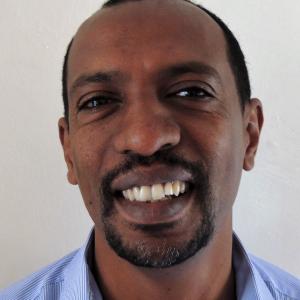Just before she and her family were displaced due to inter-communal conflict, in 2021, she experienced her first period.
Gebeyanesh’s mother made what she would normally make for herself in their hometown of Aipapo, the traditional Gumuz sanitary materials made with tree bark and cloth. Within two weeks, they hosted a conventional party celebrating a young girl’s first menstruation. Men expressed interest in marrying Gebeyanesh, but her mother sent them away. Instead, she focused on teaching her daughter about proper care and providing her with traditional bark and sanitary materials.
Not long after, conflict erupted in their community and drove Gebeyanesh and her family, along with many others to flee into the forest. Their home and everything in it was burned down. Without access to sanitary materials, both traditional and modern, the women suffered and relied on the river to wash up. Like the others, Gebeyanesh cut off strips of clothing from her dress and layered them inside her underwear. The women would use these homemade sanitary materials, and arrange leaves at the base of a tree and sit there.
UNFPA, with funding from the People and Government of Japan, sought to alleviate this challenge by implementing a project that addressed Gender-based Violence (GBV) and Sexual and Reproductive Health (SRH) in conflict and COVID-19 affected districts in the Amhara and Benishangul-Gumuz Regions of Ethiopia.
The project aimed to improve the health of vulnerable women, girls, adolescents, and youth by increasing access to and availability of quality GBV and SRH information and services. Particularly for women and girls living in an IDP camp, like Gebeyanesh and her mother, the project offered “Dignity Kits”.
The kits contain essential items for women and girls to protect themselves and maintain hygiene and dignity in the face of natural disasters and crises. Each kit contains washable and disposable sanitary pads, underwear, toiletries, a whistle, and a solar-powered flashlight.
Gebeyanesh likes the washable pads, explaining their comfort compared to traditional sanitary pads. "It is easy to maintain and we were provided with soap to wash it with," she says.
The women and girls also appreciated the bag the kit came in, the pads, and the flashlights. In the past, they used to make torches from grass when they had to go into the forest at night to change their pads. With their flashlights, they have an easier time at night, with the additional benefit of warding off possible attackers.




